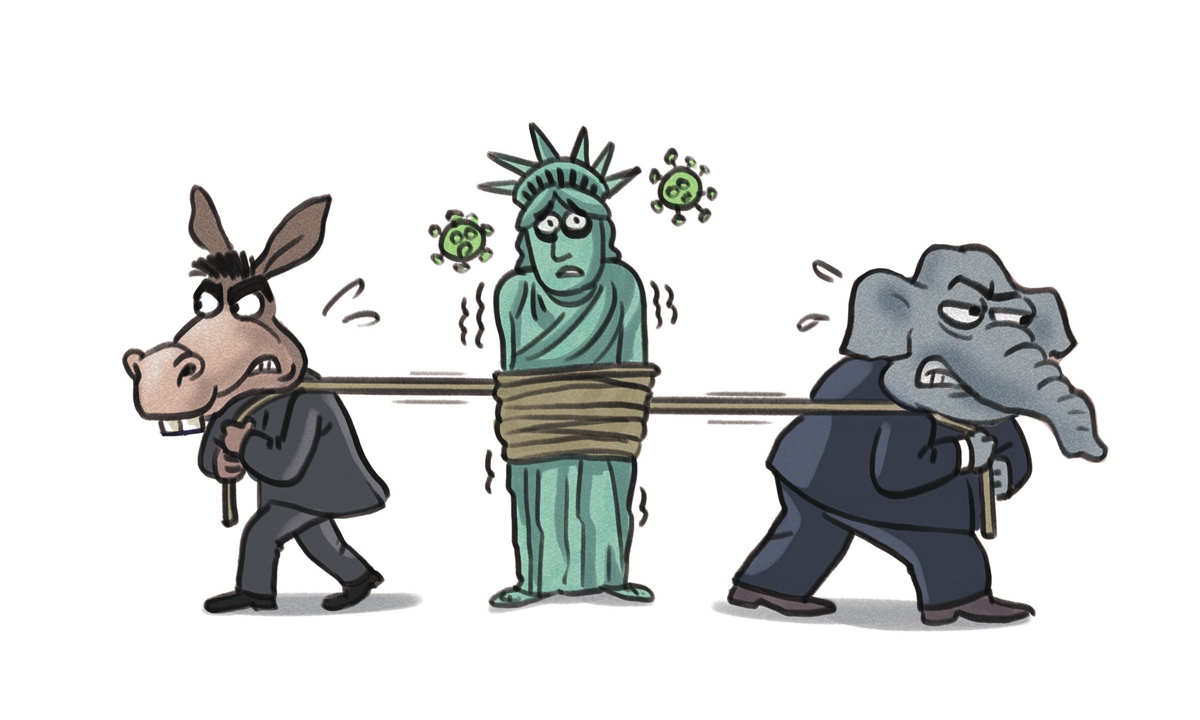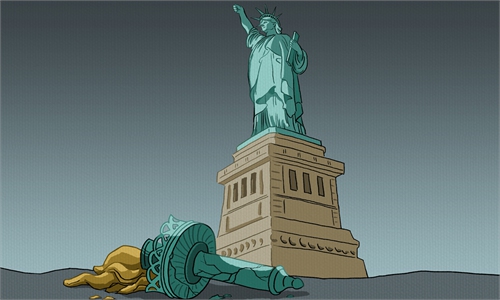
Illustration: Liu Rui/GT
The COVID-19 pandemic in the US is still worsening. Over 1,000 Americans are dying from the virus every day. In particular, the outbreak in the US is spreading to remote and rural areas. The epidemic in more than 40 states has intensified lately.
The situation may get even worse as winter approaches. The latest research report released by the University of Washington's Institute for Health Metrics and Evaluation (IHME) stated that the US death toll from COVID-19 could exceed 500,000 by February next year unless nearly all Americans wear face masks. Anthony Fauci, director of the US National Institute of Allergy and Infectious Diseases, also warned that the US is "going in the wrong direction" and that if the epidemic continues to develop like this, the US will suffer great pain.
The White House, however, sought to play down the outbreak further, arguing that it had not made a mistake with its response. In late October, White House chief of staff Mark Meadows said, "We are not going to control the pandemic," a statement that has fueled more anger at the Trump administration. Meadows' remark was politically motivated in large part to prop up US President Donald Trump's increasingly shaky campaign. On the one hand, for Trump, the campaign is the overriding priority with the election day being only hours away on November 3. Trump and Vice President Mike Pence and others have been holding non-stop rallies, calling on their supporters to get to the polls. The emphasis on containing the virus may dampen the enthusiasm of Trump's supporters to vote.
Democrats, on the other hand, have been sharply critical of Trump's response to the epidemic. If the White House starts to do its utmost to control the spread, it would prove the Democratic Party's criticism was right that Trump administration did not try everything before. The White House does not want to help the Democrats to stir up this topic.
With deteriorating viral controls in the US, the "political pandemic" is also becoming more complex. It is exacerbating the "dysfunction" of the US democratic system.
First, at the government level, the Trump administration has made major mistakes. The White House received various virus intelligence warnings as early as January, but it was slow to act. In February, Trump described US epidemic as a Democrats' "new hoax." The White House's suppression of medical and scientific professionals is jaw-dropping.
Secondly, both political parties hope to use the epidemic to seek political gains and fight their opponents. This year's presidential election has further polarized politics in the US. Democratic vice presidential nominee Senator Kamala Harris called the Trump administration's response the "biggest failure" of any US administration in history. Pence accused Democrats of undermining the administration's response by deliberately weakening Americans' confidence in vaccines.
Third, the pandemic has been portrayed in US society and to the general public as a highly politicized issue. Anti-science and anti-intellectual viewpoints are rampant. According to a Pew Research Center poll released in October, the Democrats and Republicans are sharply divided over the response to the outbreak. While 66 percent of Republicans think the COVID-19 outbreak has been made out to be a "bigger deal than it really is," just 15 percent of Democrats said the same.
Gallup, another well-known US public opinion survey agency, found that compared with Democrats, Republicans are less willing to follow guidelines issued by the Centers for Disease Control and Prevention. Wearing masks has become a "partisan" issue. Gallup's survey further shows that 94 percent of Democrats always or often wear masks, while only 46 percent of Republicans are willing to do so.
Washington should acknowledge that the US did very badly in the battle against the novel coronavirus compared to democracies like Japan, South Korea, and Germany. The Trump administration has spent $2.5 trillion on the military over the past four years. Yet it reduced spending on social programs like education and healthcare in the US. Reports say the number of Americans who have died from COVID-19 has exceeded the total number of Americans who were killed in the Korean War, the Vietnam War, the Afghanistan War, and the Iraq War.
The dysfunction of the US democracy is not only reflected in epidemic. The "political epidemic" is hindering the US from dealing with a host of economic and social ills, including relations among different ethnics, hate crimes and tax loopholes.
Such "political epidemic" in the US has caused many people to worry. As Rachel Kleinfeld, a senior fellow at the Carnegie Endowment for International Peace who specializes on conflict and fragile societies said, "Each side fears the other will destroy the nation if they achieve power."
There is no doubt that managing the "political epidemic" in the US is as difficult challenge as managing the novel coronavirus. But unlike with the virus, we cannot simply count on any vaccine for the political crisis.
The author is a senior research fellow at the Charhar Institute and an adjunct fellow at the Chongyang Institute for Financial Studies at Renmin University of China. opinion@globaltimes.com.cn

